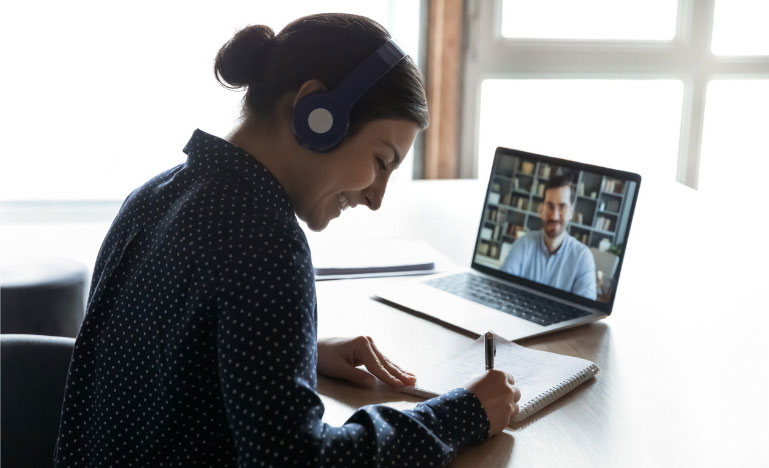Mentoring in pandemic times
Most lawyers intuitively understand the value of mentoring, but can it work in the context of remote working?

“Relationships are everything in law,” says Conrad Flaczyk, a knowledge lawyer at Norton Rose Fulbright Canada LLP. “As much as we’d like to think that we can build and maintain relationships to the same extent over the phone or by teleconference — there’s something irreplaceable about meeting face-to-face, catching-up over dinner, or simply exchanging a few words at a colleague’s desk.”
So what to do now that this irreplaceable something has been out of the equation for nearly a year?
“That is a million-dollar question,” says Sheila Archer, a retired military lawyer who is now legal counsel in BC’s Legal Services Branch and a long-time mentor. While there is uncertainty about when we’ll get back to in-person interactions,” we know that we will eventually be together again. We will probably return to the office gradually, which should allow time for young lawyers to get used to the idea of being in the office and being around people outside of their household again.”
Archer suggests young lawyers take the initiative and ask people who have been in the office or in court during the pandemic about safety protocols and other measures that will remain in place over the long term, as well as how to work most efficiently within those protocols, “rather than waiting until right before they return to the office to review what is expected. Knowing how to work within the protocols should help to increase young lawyers’ confidence about working in court or the office.”
Easing back in will require effort
Face-to-face interactions promote trust, understanding and serve to humanize lawyers’ work, says Flaczyk. “As offices being to reopen, actively seeking out opportunities to connect with others at the office will be important. Making an effort will be key, not merely leaving it to chance. Making daily walks around the floor of your office, eating in the lunchroom, participating in firm events, going out with colleagues for lunch or dinner, and occasionally stopping by your supervisor’s office to say hello, particularly for students and junior lawyers” are steps he recommends.
Young lawyers should think of their eventual return to the office as “a chance to reclaim their place in their community,” says Archer. “If there is one thing that the pandemic has taught us, it is the importance of those casual conversations in pre-COVID-19 times where we connected with our colleagues naturally.” Young lawyers will have to reconnect with co-workers at the office, however briefly, “and then follow up remotely with those people soon after from wherever they are working.”
Even with widespread vaccination, the post-pandemic workplace is likely to involve more remote or flexible work arrangements than what lawyers are typically used to, as firms rethink their operations. The profession is also going to be embracing technology more than it would have had it not been for the various lockdowns. On that front, young lawyers and students are at a natural advantage.
“Young lawyers should not assume that everyone will be as comfortable as they are with technology,” Archer notes. “But they can put their knowledge and skills to good use through suggesting other tech options or by offering tips or tricks to help clients and co-workers to become more comfortable in using other programs, including virtual software. Young lawyers are also likely to be more at ease using electronic documents for court purposes, including presenting documentary evidence electronically.”
Digital proficiency will never replace face-to-face interaction, Flaczyk says. Still, he argues “that developing a digital presence has become increasingly important in the legal profession, whether being active on social media, developing a personal website or landing page, regularly publishing a newsletter or blog and building a mailing list, hosting a podcast, or regularly contributing thought pieces or commentary on emerging issues.” He posted a list of tips for law students or young lawyers whose career was interrupted by the pandemic that include gaining experience in non-legal roles.
The rewards of digital mentoring
The nature of her practice has given Archer significant experience in remote mentoring. In the last year, she has found using Zoom much better than speaking by phone. “While it is best if you can meet in person at least once to help to build a more personal rapport, it is definitely possible to have a meaningful mentor-mentee relationship solely through virtual meetings.”
On the practical side, Archer recommends setting reminders at regular intervals. “Time flies by, and it is important for mentees and mentors to connect frequently enough. I find that using texts to set meetings followed by electronic invites works well. Email can also work, but sometimes one more email that doesn’t appear urgent is easy for a busy person to inadvertently overlook.”
She also urges mentees to follow up. Mentors, even informal ones, are usually happy to hear from them. “But mentees may have to take the initiative [...] especially if they haven’t heard from their mentor in a while.”
Archer recommends thinking of questions to ask in advance. “Having a mentor is like having a free career coach – there are no bad or stupid questions, so ask away. Mentors will try to anticipate what mentees may need, but they don’t know what the mentees’ concerns actually are, and those concerns may change over time,” she adds.
It’s also important to remember that “learning is not linear,” she counsels. “[T]he saying ‘you don’t know what you don’t know’ really applies to the last year since it is hard to be aware of developments that were discussed if you weren’t present. She recommends keeping “an open mind and to actively seek out the things that might have been missed along the way.”
Disclaimer: The views and opinions expressed by Sheila Archer in this article are those of the interviewee alone and do not necessarily represent those of the Province of British Columbia. The views expressed in this article by Conrad Flaczyk are his own and do not necessarily represent those of Norton Rose Fulbright LLP.


